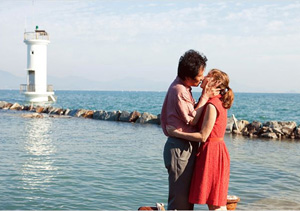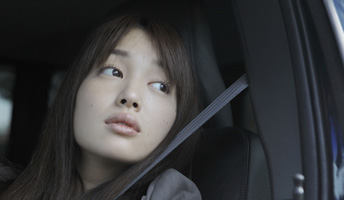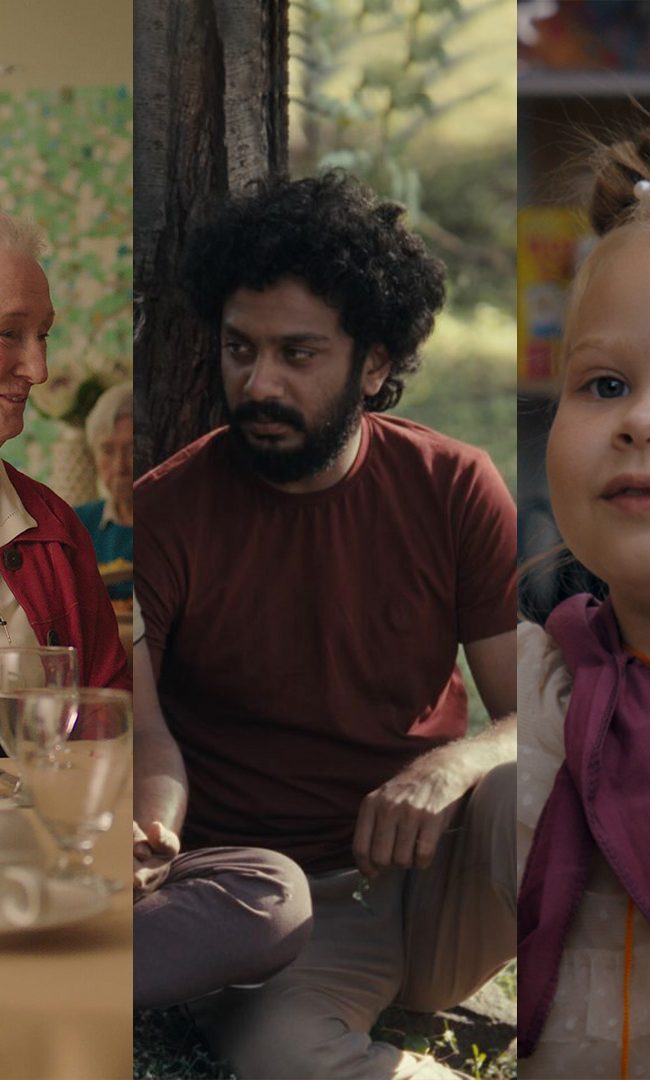Cannes 2012 Dispatch #6: Gently, Last Summer
Hong Sang Soo’s In Another Country and Abbas Kiarostami’s Like Someone In Love
If anything, a couple of days at the Cannes Film Festival quickly teaches you to ac-cent-tchu-ate the positive. Competition disappointments aplenty (the latest one being Andrew Dominik’s meandering, subpar political pulp Killing Them Softly), one latches onto the movies one truly loved, hoping their sweet aroma will keep and not get washed away by the mediocre chow that surrounds it.
 One such brittle treat in need of protection and appreciation is Hong Sang Soo’s latest effort: the effervescent comedy of repeatedly imagined life, In Another Country. Starring the freckle-faced and fearless Isabelle Huppert in a rather laid-back mode (especially when compared to her charged turn in Haneke’s Love), it’s a string of three unrelated anecdotes, each focusing on a European woman’s visit to a small seaside hotel in Korea. All of the women are played by Huppert and every story involves an almost identical set of supporting characters, albeit in various configurations and with differing outcomes.
One such brittle treat in need of protection and appreciation is Hong Sang Soo’s latest effort: the effervescent comedy of repeatedly imagined life, In Another Country. Starring the freckle-faced and fearless Isabelle Huppert in a rather laid-back mode (especially when compared to her charged turn in Haneke’s Love), it’s a string of three unrelated anecdotes, each focusing on a European woman’s visit to a small seaside hotel in Korea. All of the women are played by Huppert and every story involves an almost identical set of supporting characters, albeit in various configurations and with differing outcomes.
Overtly whimsical (presented as a young Korean woman’s three consecutive attempts at creating a short story to escape her nerve-wracking family situation), In Another Country earns its title on both literal and metaphorical level: most of what we see on the screen in fact takes place solely in the land of the writer’s imagination. Huppert’s incarnations are by turns narcissistic, love-starved, annoyed and philosophical. What connects all three anecdotes are not only the varying erotic results of the woman’s running into a beefy life guard, but also a more general sense of a summer respite as a breeding ground for fleeting temptation.
Many elements of Hong’s esthetic court a knee-jerk comparison with Rohmer, and while he’s definitely equally fond of lazy summer settings, long scenes of uninterrupted dialogue and free-floating erotic arrangements, he’s also very much his own creation. His sense of humor much more bubbly, his images way brighter and his plots structured in a palpably looser manner, Hong is mainly interested in tiny shifts of his characters’ self-image. He doesn’t necessarily reflect on the larger moral scheme of things (his My Night at Maude’s would involve more drinking and less philosophical talk, that’s for sure). Thanks in part to his punctuation device of choice (a slight, whimsically applied zoom-in), there’s always a sense of willful artificiality to Hong’s work. It’s almost as if the actors were amusing themselves with impersonating their own selves—a strategy that In Another World pretty much embodies thanks both to Huppert’s stature and the three-part structure.
 In Another Country not only is a trifle, but offers itself as such—it’s a truly humble gem by a terrific director with a superb comic sensibility. Abbas Kiarostami’s slightly baffling Like Someone In Love, on the other hand, treats itself much more seriously—even though it’s basically a comedy, and its premise would probably have been appreciated by Preston Sturges. A story of a young Tokyo escort entering a life of an aging academic and inadvertently smashing his glass-jar existence is definitely as close as Kiarostami will ever get to remaking Howard Hawks’ Ball of Fire, or at least Jonathan Demme’s Something Wild.
In Another Country not only is a trifle, but offers itself as such—it’s a truly humble gem by a terrific director with a superb comic sensibility. Abbas Kiarostami’s slightly baffling Like Someone In Love, on the other hand, treats itself much more seriously—even though it’s basically a comedy, and its premise would probably have been appreciated by Preston Sturges. A story of a young Tokyo escort entering a life of an aging academic and inadvertently smashing his glass-jar existence is definitely as close as Kiarostami will ever get to remaking Howard Hawks’ Ball of Fire, or at least Jonathan Demme’s Something Wild.
Of course, he does it in his own fashion, shifting the narrative puzzle ever so slightly, in order to make it semi-intelligible only halfway through. Even after the basic plot comes into focus, Kiarostami then proceeds to disrupt its course with multiple instances of confusing business. His framing and cutting as idiosyncratic as ever, Kiarostami manages to both tell a story and suggest that his doing so is only a collateral of a larger philosophical pursuit.
Not as frustrating as his last mind-bender, Certified Copy, the new movie won’t spawn as many Twitter-based inquiries into its enigmatic plot. It’s also both warmer and sadder, offering a vision of a brief meeting between experience and hotheadedness. What starts as a polite conversation ends up in fully confrontational mode, the impact of which is suddenly undercut and commented upon by Ella Fitzgerald’s eponymous sigh. This is probably Kiarostami’s most lyrical work to date, and for all the channeling of Ozu he occasionally does here, it’s a fully personal statement by an artist suspended as much between cultures and countries, as between various modes of cinematic expression.
[Read “Cannes 2012 Dispatch #1”]
[Read “Cannes 2012 Dispatch #2”]
[Read “Cannes 2012 Dispatch #3”]
[Read “Cannes 2012 Dispatch #4”]
[Read “Cannes 2012 Dispatch #5”]
— Michal Oleszczyk












Pingback: Cannes 2012 Dispatch #10: Love, Actually – Hammer to Nail